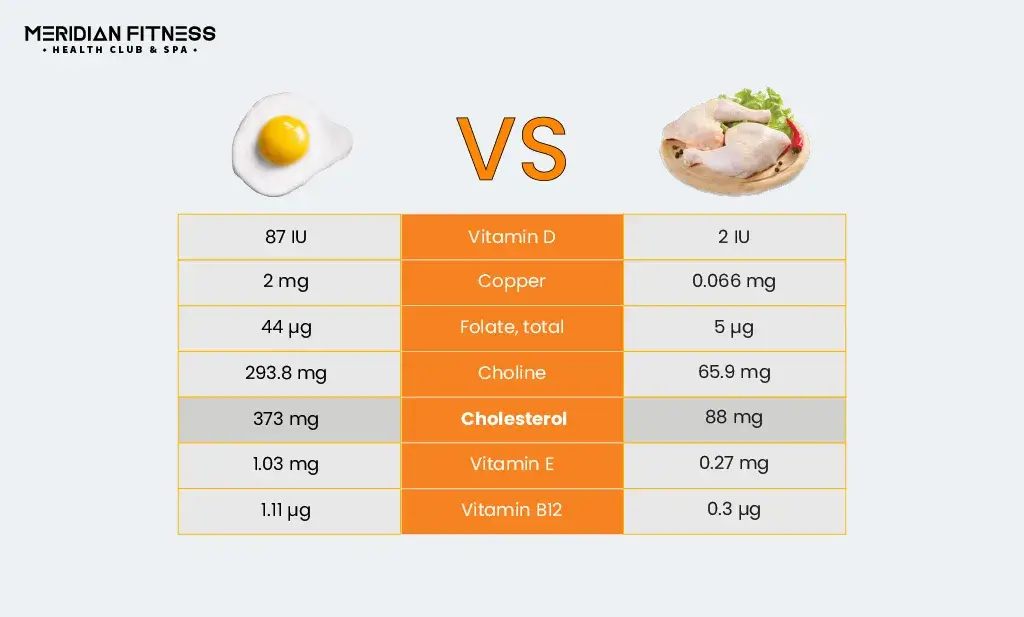We all have heard this tricky question: Chicken or egg, which came first? And the irony is we still haven’t cracked the answer! But as a fitness lover, have you ever thought about which one of them came first in terms of proteins? Some of you might be thinking that chickens lay eggs, which contain protein. Therefore, chickens must come first in terms of proteins. However, which is not fully true, and reality is a bit twisted here! So, let’s find out the answer to this famous riddle today! In addition, we will also help you identify which is the superior source of protein and why.
Why Do We Need Eggs or Chicken?
From the start, we all know the fitness lovers’ obsession with boiled eggs and chicken. Even though they don’t taste that great (in boiled form), they eat them as an easy way to fulfil their protein needs. Chicken and eggs are the most widely used sources of protein worldwide and play a vital role in the body’s structure and functioning.
Proteins are the building blocks of muscles, organs, and the immune system. In addition to this, proteins are made up of amino acids that are necessary for repairing tissues and regulating enzymes and hormones. In short, proteins are the most essential micronutrients for the human body that help muscle repair, growth, and strengthen immune function.
Nutritional Analysis: Chicken Vs. Eggs

Worldwide, chicken and eggs are popular among fitness freaks for more than one reason. The second primary reason, other than being a vital source of protein, is that they are easy to prepare and consume. Chicken is such a versatile food that it can be grilled, boiled, steamed, and roasted, making it a staple. Eggs, on the other hand, are the classics of everyday breakfast, and there is a good reason for that. Not only do they offer a fair variety of cuisines, but they also are a source of calcium, vitamins, and multiple vital nutrients for our body.
Now, let’s examine eggs and chickens in depth to decide which one provides the most protein and what roles they play in our diet.
Chicken
If we only look at the protein content, skinned chicken breast can easily beat a pack of eggs. According to research by FoodData Central, skinned chicken breast contains approximately 54 grams of protein. A skinned boneless piece of chicken breast is purely 80% protein, making it a perfect protein addition to any dish and cuisine. One more benefit of consuming chicken chest pieces is that they can keep your diet low on fat and high on protein.
Furthermore, the protein content in different cuts of chicken varies significantly. It provides us with 24 to 32 grams of protein per 100 grams, depending on the cut, which is as follows:
- Breast: 32 g
- Thigh: 25 g
- Drumsticks: 24 g
- Wings: 24 g
Nutritional Profile of 100g Chicken
If we talk about other nutrients in the 100g of chicken and compare them with the eggs, we will find that chicken somewhat lags behind the eggs in other nutrients. To help you understand the better value of chicken meals, we have displayed below the nutritional profile of chicken meat of 100g, which are:
- Protein: 27g
- Fats: 4g
- Calories: 153 mg
- Sodium: 51mg
- Cholesterol: 75mg
Overall, chicken is a very popular source of meat protein among most people, especially those who want to lose weight while maintaining their muscle mass. Furthermore, it is helpful in speeding muscle recovery and inducing healing. People who want to build muscles can rely on fattier chicken cuts like thighs and wings, as they are a great source of saturated fats and calories.
Also, people on low-carb and keto diets can greatly benefit from chicken fatty cuts. Hence, we can conclude that chicken is indeed a great choice of protein for everyone. Providing you the variation to choose the chicken cut according to your ultimate fitness goals.
Eggs
On average, one egg contains 6-7 grams of protein, and further, it depends on the size of the eggs. For example:
- A small egg weight 38 grams contains approximately 4.79 grams of protein
- A medium-sized egg weighing 44 grams contains approximately 5.54 grams of protein.
- A large-sized egg weighing 50 grams contains approximately 6.3 grams of protein
- An extra-large-sized egg weighing around 56 grams can contain approximately 7.06 grams of protein.
So, if we put it like the optimal protein intake per body weight is roughly .76 to 1.26 grams per pound. You can easily calculate how many eggs you will need to fulfil your daily protein intake.
Breaking Down the Nutrients of an Egg
Furthermore, there is one more thing to ponder: Some people are likely to eat only egg whites and leave egg yolks, which is different from eating whole eggs. There is a huge difference in the nutrient profile of the yolks, whites, and whole eggs, which cannot be denied. For example, take a look below!
Whole Eggs
One whole egg contains around 6-7 grams of protein and a wide range of multiple nutrients that are essential for our body. Some of the most vital nutrients it has are vitamins A, B2, B5, B12, D, selenium, and folate.
Egg Whites
An egg white contains around 4 grams of protein and virtually zero fat. However, it has less nutritional value than egg yolks.
Egg Yolks
Egg yolks are low in protein, containing only 2.7 grams per yolk, 1.6 grams of fat, and a high-calorie count. On the other hand, they are a powerhouse containing a number of vitamins A, E, D, and K. In addition, they also excel in the mineral content than whites containing calcium, copper, iron, manganese, zinc, selenium, etc.
According to a medicine specialist at Keck Medicine of USC, “Both white and yolk eggs are a good source of protein. They are an excellent source of vital minerals like vitamin B6, B12, and D and include cardiac-healthy unsaturated fats.”
Nutritional Values of 100g Eggs
- Protein: 13g
- Fats: 11g
- Calories: 155
- Sodium: 124 mg
- Cholesterol: 373mg
- Folate
- Phosphorus
- Selenium
- Calcium
- Zinc
Only egg yolks contain high cholesterol and unsaturated fats, approximately 186 mg per egg. However, according to a Pubmed study, eggs do not raise cholesterol levels in 70% of people. Hence, for the rest of the 30%, the key is to consume eggs moderately.
Health Considerations
Let’s investigate further into the protein contents of both egg and chicken, how they affect our health and other important factors
1. Amino Acid Profile
Both chicken and eggs are considered complete protein supplies because they contain all nine essential amino acids in sufficient amounts for human nutrition. Chicken breast is regarded as a higher-quality protein source with a complete amino acid profile.
Egg protein is also considered the highest-quality protein, providing high nutritional value and a rich content of essential amino acid profiles. Due to this quality, the World Health Organization chose eggs as a standard protein quality standard for other animal products.
2. Digestibility and Bioavailability
Both chicken and egg protein are highly digestible, and the human body can efficiently digest and utilise protein from both sources. The human body can easily digest 97% of the protein in eggs and 86% of the protein in chicken. Moreover, according to a Pubmed study, the protein in chicken breast is highly digestible, with a digestibility rate above 90%.
3. Health Impacts
Protein is an essential nutrient that our body needs because it is made up of amino acids that build and repair muscles, which we need more and more as we age. In addition, several studies have shown that higher protein intake helps to maintain bone mineral density. Eggs are also known to help with vitamin D deficiency, boost serotonin levels in the brain, and improve mood.
In conclusion, both chicken and eggs offer numerous health benefits to our bodies as quality sources of protein and multiple essential nutrients. However, individuals should always be aware of potential concerns they might face, like cholesterol from eggs. Also, the importance of hygienic preparation of chicken is important for better food safety.
Practical Considerations of Egg and Chicken
1. Versatility in Cooking
Both chicken and eggs are versatile, cost-effective, and nutritious options, making them a great choice for those looking to increase their organic protein intake. Additionally, both foods can easily be incorporated into a variety of dishes, making them great additions to any diet.
Eggs can be the star of main courses like omelettes and quiches or the binding, leavening, and glaze for other dishes. Sometimes, they are even used as emulsifiers and taste enhancers like cakes, bread, dressings, and sauces. Chicken is also the star of many main dishes, from grilled to stir-fries. Chicken is versatile in the kitchen for many cuisines.
2. Dietary Preferences and Restrictions
No matter what diet you like to follow, both chicken and eggs are suitable for all except one: a raw and vegetarian diet, which might not be suitable for some people.
- Keto Diet: Both egg and chicken are the specials of the keto diet.
- Paleo Diet: Eggs, ranch chicken, and lean protein are paleo diet friendly.
- Vegetarian Diet: Here, only eggs are allowed in a vegetarian diet.
- Mediterranean Diet: Eggs are the staple in the Mediterranean diet, and chicken is moderately used in some.
- Raw food Diet: it depends on person to person, somehow eggs are widely used in raw diet leaving out the chicken. Because chicken needs to be cooked to be edible.
Note: Consider any allergies or dietary restrictions when selecting either eggs or chicken. Additionally, be aware of the environmental impact of each food, such as where and how they are produced.
Final Thoughts
Finally, it is time to conclude which comes first: egg or chicken protein! To be precise, eggs and chicken are both quality animal and organic protein sources. They both contain all nine amino acids essential for the human body and possess biological value.
But the twist is that when we particularly talk about protein, skinned chicken breast takes the lead as it has much more protein than eggs. Eggs are full of so many healthy nutrients that they complete the meal. So, it narrows down to your preferences. If you prefer a more complete food with plenty of nutrients, eggs are the best choice for you. But if you only like to carb on high-quality poultry protein, chicken would win out.








